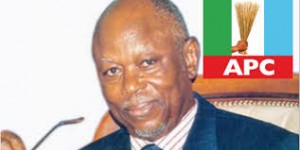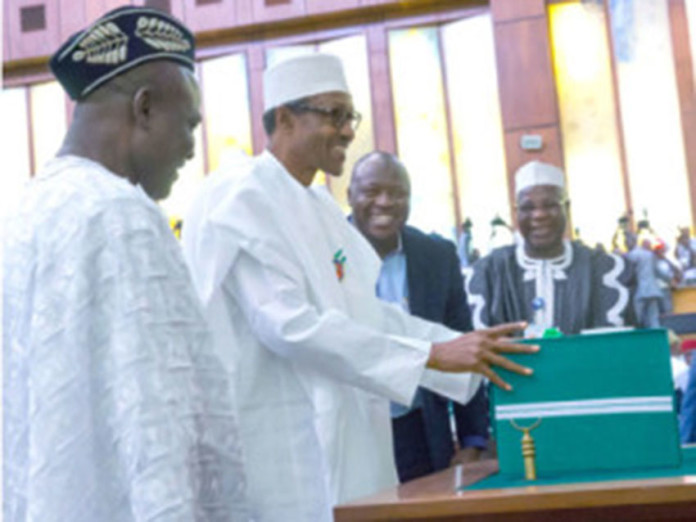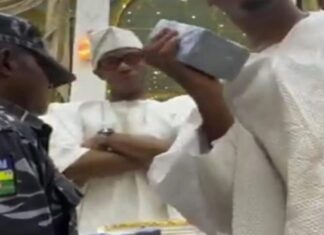President Muhammadu Buhari on Tuesday presented the 2016 budget proposal of N6.08 trillion to the joint session of the National Assembly, where, in an unprecedented move, the All Progressives Congress (APC)-led government allocated 30% of the total budget for capital expenditure.
However, it is always the vote from which corrupt politicians steal public funds with unreserved glee and abandon the projects’ implementation, making the record allocation synonymous with record treasury-looting.
Presenting the budget, President Buhari promised that the 2016 budget represents a major step in delivering a new opportunity for Nigeria, expressing optimism that despite the challenging times, his administration had the will, resourcefulness and commitment to deliver prosperity to Nigerians.
According to him, his administration will devote a significant portion of the recurrent expenditure to institutions that provide critical government services.
Accordingly, the Federal Government will spend N369.6 billion on Education; N294.5 billion on Defence; N221.7 billion on Health and N145.3 billion on the Ministry of Interior.
He added that this will ensure that teachers, armed forces personnel, doctors, nurses, policemen, fire fighters, prison service officers and many more critical service providers are paid competitively and on time.
“To deliver our development objectives, we have increased the capital expenditure portion of the budget from N557 billion in the 2015 budget to N1.8 trillion in the 2016 budget. Distinguished and honourable members of the National Assembly, for the first time in many years, capital expenditure will represent 30% of our total budget. In future years we intend to raise the percentage allocation for capital expenditure,” he said.
“This increased capital expenditure commits significant resources to critical sectors such as Works, Power and Housing, N433.4 billion; Transport, N202.0 billion; Special Intervention Programmes, N200 billion; Defence, N134.6 billion and Interior, N53.1 billion. These investments in infrastructure and security are meant to support our reforms in the Agriculture, Solid Minerals and other core job-creating sectors of our economy.
“Indeed, the future looks bright and I ask that we all work together to make this vision a reality. The 223% year-on-year growth in capital expenditure demonstrates our desire to make Nigeria more competitive, and start the journey to deliver sustainable development in our country.
“In fulfilment of our promise to run a lean government, we have proposed a 9% reduction in non-debt recurrent expenditure, from N2.59 trillion in the 2015 budget to N2.35 trillion in 2016.
“Furthermore, we have budgeted N300 billion for Special Intervention Programmes, which takes the total amount for non-debt recurrent expenditure to N2.65 trillion.
“As I mentioned earlier, the Efficiency Unit set up by this administration together with effective implementation of GIFMIS and IPPIS will drive a reduction of overheads by at least 7%, personnel costs by 8% and other service-wide votes by 19%. Distinguished and honourable members, this budget will be executed to provide optimum value by ensuring every naira spent by this government counts.
He said, “Based on the assumptions I presented earlier, we have proposed a budget of N6.08 trillion with a revenue projection of N3.86 trillion resulting in a deficit of N2.22 trillion.
“The deficit, which is equivalent to 2.16% of Nigeria’s GDP, will take our overall debt profile to 14% of our GDP. This remains well within acceptable fiscal limits.
He further explained that the deficit would be financed by a combination of domestic borrowing of N984 billion and foreign borrowing of N900 billion, totaling N1.84 trillion, adding that “over the medium term, we expect to increase revenues and reduce overheads, to bring the fiscal deficit down to 1.3% of GDP by 2018.”
President Buhari maintained that the 2016 budget, as outlined, was designed to ensure the revival of the economy, deliver inclusive growth to Nigerians and create a significant number of jobs.
“We aim to ensure macroeconomic stability by achieving a real GDP growth rate of 4.37% and managing inflation. To achieve this, we will ensure the aligning of fiscal, monetary, trade and industrial policies.
“As we focus on inclusive growth, we are conscious of the current rate of unemployment and underemployment. This is a challenge we are determined to meet, and this budget is the platform for putting more Nigerians to work.
“I can assure you that this administration will have a job creation focus in every aspect of the execution of this budget. Nigeria’s job creation drive will be private sector-led. We will encourage this by a reduction in tax rates for smaller businesses as well as subsidized funding for priority sectors such as agriculture and solid minerals.
“As an emergency measure to address the chronic shortage of teachers in public schools across the country, we also will partner with state and local governments to recruit, train and deploy 500,000 unemployed graduates and NCE holders. These graduate teachers will be deployed to primary schools, thereby enhancing the provision of basic education, especially in our rural areas.”
He further revealed his administration’s plan to collaborate with state and local governments to provide financial training and loans to market women, traders and artisans through their cooperative societies.
“We believe that this segment of our society is not only critical to our plan for growing small businesses, but it is also an important platform to create jobs and provide opportunities for entrepreneurs,” he stated.
On the 5,000 monthly stipends to the poorest and the vulnerable, he said, his government is working with various development partners, through the office of the Vice President, to design an implementable and transparent conditional cash transfer programme for that segment of the population.
“This programme will be implemented in phases. Already, the compilation of registers of the poorest persons is ongoing. In the coming weeks, we will present the full programme, which will include our home-grown public primary school feeding and free education for science, technology and education students in our tertiary institutions. Indeed, this will mark a historic milestone for us as a nation,” Buhari said.
Budget passage not important as implementation – Dogara
The Speaker of the House of Representatives, Hon. Yakubu Dogara, has assured of speedy passage of the 2016 Appropriation Bill by the National Assembly.
He, however, asserted that the passage of the budget was not an end in itself but the implementation of the budget by the Executive.
The Speaker stated Tuesday while giving a vote of thanks after the presentation of the 2016 budget proposal by President Muhammadu Buhari to a joint session of the National Assembly in Abuja that the National Assembly is committed to ensuring that the budget was passed without delay.
“While thanking Mr President for meeting the constitutional requirement for the presentation of the budget estimates, I wish to reiterate that a well-crafted budget is not an end in itself; the real meat of a budget is in its implementation.
“The National Assembly will endeavour to scrutinise and pass the budget in good time to facilitate early commencement of its implementation,’’ he said.
Dogara said that the National Assembly may need to prescribe a period as financial year for the government’s budget implementation in line with provisions of Section 318 of the 1999 Constitution.
This, he said, was necessary “whenever the budget is not passed before January 1 in any given year.’’
He said that a budget may have a realistic chance of implementation when the executive had 12 uninterrupted months to execute it.
“Mr President’s Change Agenda can only be realised for the benefit of the Nigerian people when his policies and programmes are faithfully executed,’’ he said.
The Speaker, who urged lawmakers to see their recess as a working period, said that oversight functions should be diligent, thorough and intensive.
APC hails 2016 budget, calls it ‘budget of change’
The All Progressives Congress (APC) has hailed the unprecedented N6.08 trillion ‘Budget of Change’ personally presented by President Muhammadu Buhari to the joint session of the 8th National Assembly Tuesday.

APC Chairman, Chief John Odigie-Oyegun gave the assurance that many of the promises made to the Nigerian electorate by the party in the course of the 2015 presidential campaign are contained in the proposed 2016 national budget.
Odigie-Oyegun stated that the present administration’s pro-people policies woud be implemented fully in the coming 2016 financial year.
He said: “In fulfilment of APC’s election promises to the Nigerian electorate, the party welcomes the proposed social welfare programmes contained in the proposed 2016 national budget submitted to the National Assembly. President Buhari has proposed N500 billion to pay unemployed Nigerian graduates (post-NYSC grant) and feed school children, among other social welfare programmes in 2016.
“Compared to the last 16 years of locust, Nigerians are getting a much better deal from the seven-month old APC-led administration. On the strength of these proposals, the future holds more dividends of democracy for Nigerians.
“It is reassuring that the federal government has recovered huge sums from looters of our common wealth, which will be injected into the 2016 national budget.”
Odigie-Oyegun called for a speedy passage of the proposed national budget.
Buhari’s budget is a big fraud – PDP
…Says president is planning to mortgage Nigeria’s future
The Peoples Democratic Party (PDP) has described the N6.08 trillion 2016 Federal budget presented by President Muhammadu Buhari as a big fraud and executive conspiracy tailored towards mortgaging the future of the nation.
The party queried President Buhari’s decision to borrow N2.2 trillion, the biggest in the history of the nation, describing it as the height of recklessness and deceit from a government that thrives on propaganda.
The PDP, in a statement by its national publicity secretary, Chief Olisa Metuh, berated the Federal Government for trying to use its bogus welfare programme and phantom capital projects as cover and conduit to siphon the funds to satisfy partisan interests, particularly to settle huge campaign debts.
“It is obvious that this budget is an extension of the campaign promises of the APC government, presented as a manifesto filled with bogus promises whose implementation will be inconclusive, thereby allowing the APC to once again deny their promises.
“There has never been any known economy in the world where government deliberately mortgages the future of its nation by borrowing excessively to finance partisan interests while hiding under bogus welfare programmes. This is more so important as the APC, in reeling out their bogus campaign promises, never informed Nigerians that it would mortgage their future through excessive borrowing.
“We have it on good authority that this is the first in the series of APC borrowings which would leave the future generation of Nigerians under the burden of huge debts after four years,” it claimed.
-Leadership















